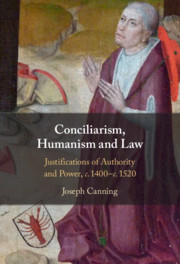This essay adds to our knowledge of the Council of Ferrara-Florence (1431–1449) as a complex but significant instance of the many efforts to bring union to the divided Latin West and Byzantine East. In this paper, I explore the role of Augustine as an auctoritas at Ferrara-Florence, examining Juan de Torquemada's Apparatus Super Decretum Florentinum Unionis Graecorum (1441), a programmatic theological treatise written to represent the Latins’ theological perspective as expressed in Laetentur caeli (“Let the heavens rejoice”), the papal bull disseminated by Pope Eugenius IV on July 6, 1439. I argue that Torquemada's use of Augustine corroborates the otherwise circumstantial probability that he composed the Apparatus to explain the theological terms on which Eugenius IV and the Latin papalists declared union with Byzantine Christians and simultaneously to defend the bull against the doubts held among conciliarists and their sympathizers around Europe. Showing how Torquemada used Augustine in this conciliar document also adds greater clarity to the reception of Augustine at the Council of Ferrara-Florence. More specifically, it helps explain the utility of Augustine in Torquemada's attempt to adjudicate the relations between the Latin West and Byzantine East on the one hand and papalist and conciliarist Latins on the other.
